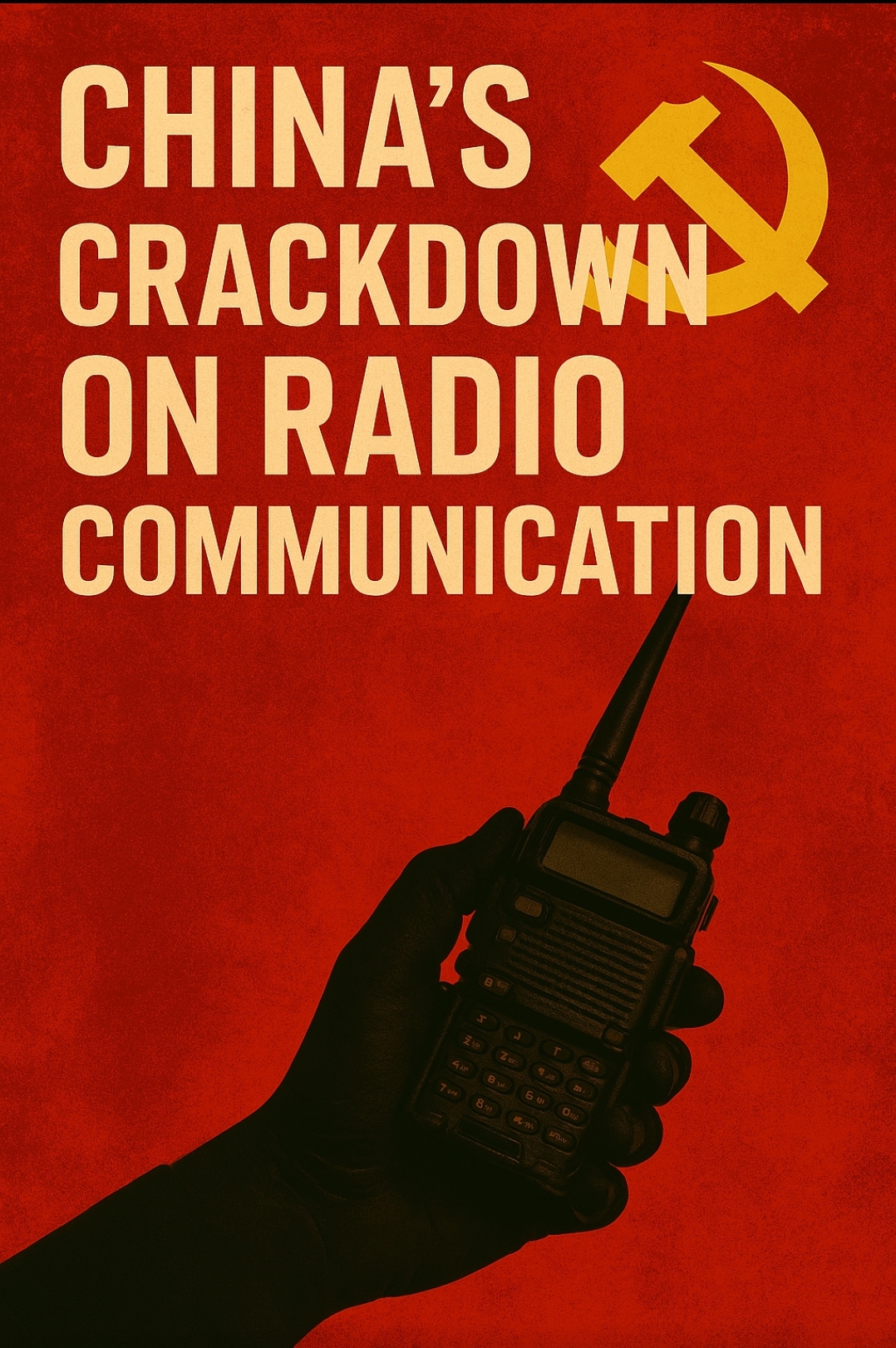China’s crackdown on radio communication: A new front in its war on information

The Chinese Communist Party (CCP) has long been infamous for its authoritarian control over information, restricting internet access, censoring social media, and deploying a vast surveillance state to monitor its citizens.
Now, in a fresh attempt to tighten its grip on communication, the Chinese regime has turned its attention to radio waves.On March 23, China’s Ministry of State Security (MSS) issued a stark warning on its official WeChat account about the "threat" posed by radio communication equipment.
The statement claimed that radio waves could be used to spread a large amount of information, implying that such transmissions pose a national security risk.
This move signals the regime’s growing fear of alternative channels of communication that remain beyond its reach, particularly in the wake of tightening internet controls.The Chinese government’s suppression of free speech and access to information is nothing new.
It has implemented the world’s most sophisticated internet censorship system, often referred to as the "Great Firewall."
Through this system, Beijing blocks thousands of websites, including foreign news platforms, social media networks like Facebook and X (formerly Twitter), and encrypted messaging services such as Telegram and WhatsApp.Beyond cyberspace, China also enforces strict regulations on print and broadcast media, ensuring that state-approved narratives dominate all news coverage.
Journalists and bloggers who attempt to challenge official narratives face harsh consequences, including imprisonment and forced confessions.However, despite these stringent measures, some Chinese citizens have managed to bypass government-imposed restrictions using Virtual Private Networks (VPNs) and encrypted messaging applications.
The CCP’s latest move against radio communication suggests a growing paranoia about alternative, offline methods of information dissemination.Why is China targeting radio communication?The Chinese regime’s concerns over radio waves stem from the medium’s ability to facilitate uncensored communication.
Unlike the internet, which is easier to surveil and control through centralised networks and service providers, radio transmissions operate on frequencies that can be difficult to regulate and intercept.Historically, radio has played a crucial role in facilitating free expression under repressive regimes.
In the Soviet era, Western radio stations such as Radio Free Europe and Voice of America broadcast uncensored news behind the Iron Curtain.
More recently, dissidents in countries with strict internet censorship, such as North Korea and Iran, have relied on radio waves to access independent information.China has previously targeted radio communications by jamming international broadcasts from outlets like the BBC and Voice of America.
The latest warning from the MSS suggests that the government now seeks to impose tighter domestic restrictions as well.Restricting radio communication would further limit the avenues available for Chinese citizens to access independent news, particularly in rural areas where internet access remains limited.
For dissidents, activists, and underground journalists, radio offers a lifeline to uncensored information.
A crackdown on radio communication could force these groups to adopt even more clandestine methods to share and receive news.Furthermore, amateur radio operators, who often communicate using shortwave frequencies, could find themselves facing new legal restrictions or penalties.
The MSS’s warning raises concerns that individuals using ham radios or other radio communication devices might be labeled as "security threats," much like internet users who access banned websites or use VPNs.The push to regulate radio communication aligns with China’s broader strategy of intensifying mass surveillance.
The CCP has already deployed an extensive network of facial recognition cameras, artificial intelligence-powered tracking systems, and data-monitoring programs to keep tabs on its citizens.
Expanding censorship to radio waves is another step toward ensuring that all means of communication remain under state control.Additionally, China has been exporting its surveillance technology to other authoritarian regimes, providing a blueprint for digital repression worldwide.
If the CCP successfully implements tight restrictions on radio communication, it could serve as a model for other governments seeking to suppress free speech.China’s latest move is likely to draw international condemnation from human rights organisations and press freedom advocates.
Groups such as Reporters Without Borders and Amnesty International have previously criticised China’s censorship policies, warning that such measures violate fundamental human rights.Foreign governments may also respond by increasing their own efforts to provide uncensored information to the Chinese public.
In the past, Western countries have used radio broadcasts to penetrate the information blockade imposed by authoritarian regimes.
If China severely restricts domestic radio communications, international broadcasters may find new ways to reach Chinese listeners, such as satellite transmissions or encrypted digital radio signals.China’s attempt to crack down on radio communication is yet another example of the CCP’s relentless pursuit of total information control.
However, history has shown that authoritarian regimes ultimately struggle to suppress free speech indefinitely.
Whether through underground radio networks, encrypted messaging services, or other technological innovations, those committed to truth and transparency will always find ways to communicate.As China tightens its grip on yet another form of communication, the global community must remain vigilant and supportive of those who seek to challenge censorship. Information is power, and the fight to keep it free is far from over.




![From Kathmandu to the World: How Excel Students Are Winning Big [Admission Open]](https://nepalaaja.com/img/70194/medium/excel-college-info-eng-nep-2342.jpg)
